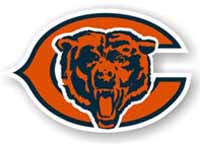
Last weekend's game between the Bears and the Browns was ugly. Rookie quarterback Justin Fields started the game in place of an injured Andy Dalton. We all knew that Fields would start eventually, but this was not the game to throw him to the sharks.
Just like I said at the end of preseason, the Bears' offensive line was completely unable to hold off an aggressive pass rush from the Browns. But it was far uglier than I think any of us thought it would be, as the Browns totaled 9 sacks of poor Justin Fields. I think we all hoped that his mobility would allow him to escape the pocket and make plays on the ground, but it did not pan out that way. Fields often looked timid while moving around, as if he was trying to force the ball downfield rather than let himself take off and run. This resulted in him being dragged down from behind several times, and taking a lot more hits than he should have.
 Photo by Associated Press
Photo by Associated Press
Justin Fields was sacked 9 times by the Browns, and couldn't move the ball at all.
The Bears' offense was completely incompetent. It wasn't just pass blocking and Fields. The running game wasn't very effective, and receivers were dropping more than their fair share of passes. The whole offense looked like it was completely overwhelmed and shell-shock -- not just Fields. [More]
58696590-8a30-4204-bfa9-75708b71e7a0|0|.0
Tags:Chicago Bears, NFL, football, preseason, Justin Fields, Andy Dalton, Nick Foles, Matt Nagy, Cleveland Browns, Myles Garret, injury
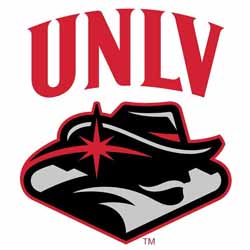
The COVID-19 pandemic prevented me from going to the UNLV home football games in their first year at the new Allegiant Stadium. But being vaccinated, I am planning on attending this year, and did go to the home opener this week. It was yet another embarassing disappointment. Worse yet, I suspected it would be, and I wanted to bet on Eastern Washington to win the game, but the stupid sportsbook wasn't taking any action on the game. I guess they don't trust UNLV's football team any more than I do.
The offense was completely unable to move the ball in the first half, due largely to completely incompetent play from starting quarterback, Justin Rogers (transfer from TCU). Right off the bat, coach Arroyo dialed up some vert routes and got the two-on-one matchup against the safety that he and Rogers wanted, Rogers saw it, but his pass was low and inside, instead of high and away from the defender. It wasn't intercepted, but it might was well have been because the team couldn't get a first down anyway.
This happened several more times throughout the first half. And when Rogers wasn't failing to throw the ball deep, he was throwing gutterballs to the feet of his open underneath receivers. I don't know if this was a case of the jitters or what, but Rogers clearly did not have his head in the game. The receivers were clearly frustrated. So were the fans. But apparently, coach Arroyo wasn't because Rogers started the second half as well, and didn't play any better.
I don't know why it took so long for coach Arroyo to recognize that his starting quarterback was incapable of running the offense, and why it took him so long to put in the backup. I probably would have switched to the backup in the second quarter. I was willing to give Arroyo a lot of slack last year because COVID threw a wrench in everything in 2020, but there's no more excuses this year. That inability to recognize the need to make a change is a real concerning red flag for Arroyo's future as head coach.
I was also concerned with Arroyo's insistence on continually calling screen passes to wide receivers, even though Eastern Washington was clearly prepared for them and jumped every one of them for a loss or short gain. Yet he still played soft coverage against Eastern Washington running those same screens for large chunks of yards all night. His play-calling also didn't help the struggling Rogers, as Arroyo repeatedly called deep shot plays without any underneath checkdowns for Rogers to fall back on if the play didn't break downfield. It may only be his second year, but Arroyo is already on thin ice as far as I'm concerned.
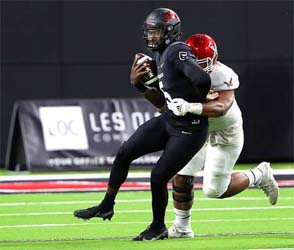 Photo credit: Steve Marcus, Las Vegas Sun.
Photo credit: Steve Marcus, Las Vegas Sun.
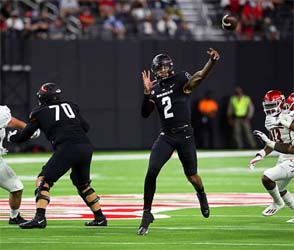 Photo credit: Steve Marcus, Las Vegas Sun.
Photo credit: Steve Marcus, Las Vegas Sun.
Justin Rogers was inept at quarterback and had to be replaced with the dazzling Doug Brumfield.
When Rogers was finally pulled midway through the third quarter, backup Doug Brumfeild looked brilliant and almost single-handedly saved the game for the Rebels. He threw up one prayer ball to double coverage in the endzone on a third and, like, 30. There were two receivers uncovered underneath. They wouldn't have gotten a first down, but they at least would have made the field goal attempt easier. The kicker (who was probably UNLV's co-MVP) made the kick anyway, so I guess it's moot, but I felt like that prayer ball was Brumfield's only legit bad decision the entire game. Other than that, he was damn near perfect. Every pass he threw was right into the receivers' hands. It's just too bad that the receivers had trouble reeling in the laser beams he was throwing, and dropped several passes, including a couple third down ones. One pass even went off the hands of a receiver and right into the hands of a waiting safety. [More]
49389006-d67f-4036-be04-5344f50f97e1|0|.0
Tags:UNLV, University of Nevada Las Vegas, Eastern Washington University, Marcus Arroyo, Las Vegas, football, college football, Allegiant Stadium, Justin Rogers, Doug Brumfield, Nohl Williams, Charles Williams, targeting, penalty, COVID-19, pandemic

A lot of my initial excitement for the Bears' potential in 2021 has been dampened by a lackluster preseason. It didn't matter whether Andy Dalton was playing quarterback or Justin Fields, the offense struggled to move the ball.
Most of this was due to poor offensive line play. I didn't get to watch the games live, but I looked up as much highlights and play-by-play as I could later in each week, and what I saw showed that all the Bears' quarterbacks were constantly under pressure. There was very little time to stand in the pocket and throw. The running game wasn't particularly dominant either, and the Bears had to endure a lot of three-and-outs.
Dalton looked fine when he had time to throw, but he rarely had time and wasn't able to make things happen while under pressure. Fields seemed to have the better preseason, but this was mostly owing to his ability to get out of the pocket and run for yardage and first downs. He had very little time to throw as well and didn't exactly look spectacular throwing the ball. Though he did make some very nice improvisational plays in the final preseason game against the Titans.
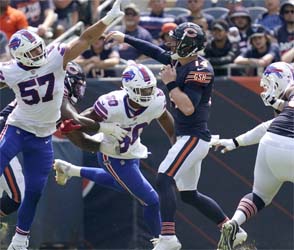 - photo by Nam Y. Huh, Associated Press
- photo by Nam Y. Huh, Associated Press
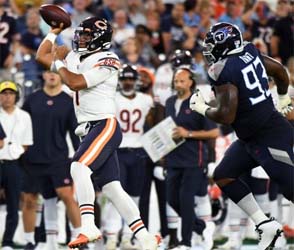 - photo credit unknown
- photo credit unknown
All the Bears QBs had to struggle with constant pressure.
Justin Fields at least has the mobility to get out of the pocket and make something happen.
There is a lot of popular demand to start Fields in the regular season, but I'm not so sure that is a good idea. If this offensive line cannot play better in the regular season, I would worry about the long-term health of Fields. He would likely take a lot of sacks and have to run and expose himself to lots of hits.
A big reason for the offensive line struggles is that the Bears are short at left tackle. Their other big-name draft pick was tackle Teven Jenkins, who may miss most (if not all) of the season after having back surgery in the summer. The Bears were so confident that he's be able to step in and start his first year that they released their previous starting left tackle, Charles Leno Jr.. With Leno (perhaps their best pass blocker last year) gone, and Jenkins out indefinitely, pass blocking is probably the single biggest area of concern.
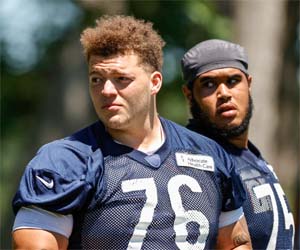 - photo credit BearsWire
- photo credit BearsWire
Teven Jenkins' injury is straining the O-Line.
Yes, the Bears did win 2 of their 3 preseason games, so perhaps that is something to be optimistic about. The defense played well in 2 of those 3 games, and the offense did do just enough to take and hold a lead. But most of that success was against backups after the first quarter was over.
As far as preseason stand-outs, receiver Rodney Adams and tight end Jasper Horstedd had some exciting and explosive plays. I think Adams will definitely earn himself a position on the team, even if it's in a rotational receiver role.
Honestly, as excited as I am to see Justin Fields leading this team, I do worry that maybe this isn't the best situation for him. Unless the Bears can shore up their offensive line with a free agent signing or two, or a trade for an upgrade at one or both tackle positions, starting Fields might just be setting the poor kid up for failure.
I have tickets to the Bears road game against the Raiders in October. I suspect that Fields will be the starter by that time, especially if the Bears offense under Dalton is as bad at converting third downs as they were in the preseason. But I also worry that if he is starting by that time, that he might not finish the season.
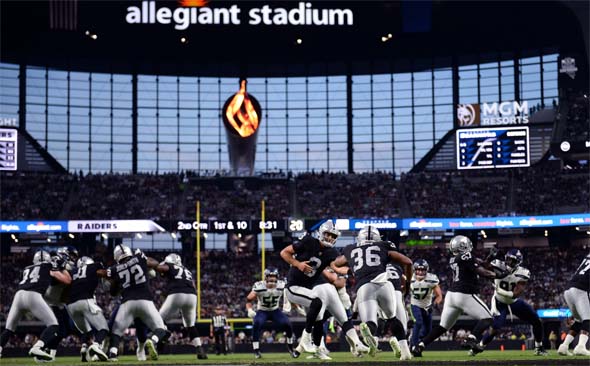 Photo by Orlando Ramirez, USA Today Sports
Photo by Orlando Ramirez, USA Today Sports
I'll be seeing my first ever NFL regular season game in-person when the Bears visit the Raiders in October. [More]

The Chicago Bears really hit it out of the park with the 2021 draft. What's funny is that this draft mirrors the Bears' dumbfounding 2017 draft, but with an almost polar opposite outlook. In 2017, the Bears infamously traded up one spot to take Mitch Trubisky with the number 2 overall pick. At the time, Bears fans and sports pundits were scratching their heads wondering what the heck Ryan Pace was thinking, as Trubisky wasn't even projected to be the best QB in the draft, let alone the second best player overall. With the gift of hindsight, the Bears' pick looks even worse considering that both Patrick Mahomes and Deshaun Watson were both available, and neither was drafted in the top 10. Other notable players from that draft whom the Bears passed on drafting include Jamal Adams (pick 6 to the Jets), Christian McCaffery (pick 8 to the Panthers), Marshon Lattimore (pick 11 to the Sants), and Evan Engram (pick 23 to the Giants).
Photo by Chicago Bears
The Bears got a steal at the 11th overall pick in quarterback Justin Fields from Ohio State.
The Bears once again traded up to select a QB in the first round. Many analysts listed Justin Fields as the 3rd best QB in the draft, but also acknowledged that the top 3 positions were close to being a toss-up. Fields could easily have been the third overall pick to the 49ers, but San Francisco opted to take Trey Lance instead. This meant that Fields was still available at pick 11, after both the Broncos and Eagles passed on selecting him. The Bears traded up with the Giants to select Fields 11th overall. Like I said, the situation resembles the 2017 draft, except instead of trading up one space to reach for a QB who everyone expected would be available much later, the Bears patiently waited to steal a top talent who had slipped to a later pick. Sure the Bears gave up their first-round pick for next year's draft, but they got a much better value from it this time around.
The Bears had a similar opportunity in the second round, trading up with the Panthers to take offensive tackle Teven Jenkins with the 7th pick of the second round. Jenkins was projected to be a first-round talent, but slipped to the second round. Once again, the Bears got excellent value for their pick. Fields may sit behind Nick Foles and/or Andy Dalton for a period of time, but Jenkins will likely be a started in week 1 (especially since the Bears promptly cut veteran tackle Charles Leno Jr. after drafting Jenkins). And even if Fields does sit behind one of the veterans, I fully expect that he'll be starting by the end of the season.
Not only are both Fields and Jenkins excellent picks in their own right (and excellent value), but they also compliment each other well: an elite passer and an elite pass protector. The fact that both slipped to later picks (or rounds) will also potentially mean that both will be playing with a chip on their shoulders.
Photo by Brett Deering, Getty Images
Fields can likely feel safe with offensive tackle Teven Jenkins blocking his blind side.
[More]
e4293e40-eab5-42d7-9d9b-d1b1291ea193|0|.0
Tags:Chicago Bears, draft, Justin Fields, Teven Jenkins, Larry Borom, Khalil Herbert, Dazz Newsome, Thomas Graham Jr, Khyiris Tonga, Ryan Pace, Mitch Trubisky, quarterback, trade
I've been a vocal "hater" of Tom Brady (and the New England Patriots) for many years. In fact, ten years ago, I wrote a post about how seeing the Colts playing without Payton Manning (who had been sidelined with an injury) proved that Manning is a better quarterback (and more valuable asset to the team) than Tom Brady. In the meantime, I've continued to maintain that the Patriots are just a very well-run and well-coached football team that would still be very successful even without Tom Brady. But Brady has now gone on to win four more SuperBowls since then, and yesterday, he did one of the things that we haters said would be one of the few things that would change our mind: he won a SuperBowl for a team other than the New England Patriots.
With his seventh SuperBowl victory yesterday, it's becoming increasingly hard to argue that he isn't the "G.O.A.T." (Greatest of All-Time). He is certainly the most accomplished player in NFL history. Despite this SuperBowl win, and despite Brady's success and accolades, his career is still loaded with "yeah buts".
Tom Brady has now silenced many of his doubters by winning a SuperBowl with a team other than the Patriots.
The best team in the worst division of football
First and foremost, he spent his entire career playing in the worst division in football. The Jets, Dolphins, and Bills have consistently been among the worst teams in the league through the Patriots' 20-year dynasty. The Jets had a couple years under head coach Rex Ryan in which they were considered SuperBowl contenders, but their failures exposed them as more pretenders than serious contenders. It is only now in 2020 that the Bills are suddenly good, and the Dolphins almost put together a playoff-worthy record. And it just so happens that AFC East teams becoming good is the very year that Brady jumps ship from the Patriots.
Is Brady finally out of Belichick's shadow?
Tom Brady and Bill Belichick have had a sort of "John Lennon, Paul McCartney" thing going on, in which people argued about whether they are as good on their own as they are together. Well now we finally got to see Belichick fail miserably at coaching a Brady-less team, and got to see Brady win a championship for a team not coached by Belichick. It's easy to see this as vindication for Brady (and many do see it as exactly that), but I'm still not entirely sold.
First and foremost, I point to 2008, when Brady was sidelined with injury, and Matt Cassel had to start the rest of the year. Cassel played exceptionally well, the Patriots went 11-5, and only missed the playoffs because they lost tie-breakers to the Dolphins (for the division title) and Ravens (for a wildcard spot). Cassel became the hottest free agent in the NFL that following offseason, and largely flopped at every team he played at since. The Patriots without Tom Brady were still playoff contenders.
Matt Cassel looked like an all-star and almost
lead Patriots to the playoffs in 2008.
We also saw the Patriots perform well during Brady's four-game "Deflategate" suspension in the 2016 season. The Patriots won 3 of those 4 games (convincingly) en route to a comeback SuperBowl championship against the Falcons. We've seen the Patriots be god without Tom Brady, multiple times.
We didn't see a Brady-less Patriots team again until 2020, which, of course, was the year of COVID. It's hard to really judge anything that happened this season because the whole thing was so topsy-turvy. The pandemic was disruptive to many teams' training camps, as it limited team activities. Almost every team had players opt-out of playing in the season altogether. Because of these disruptions to activities and rosters, it is very likely that otherwise good teams may have underperformed. One of the hardest-hit teams might have been the New England Patriots, which had to make due with six players opting-out, including two defensive starters and a starter on the offensive line. Furthermore, positive COVID tests for players (including elite defensive back Stephon Gilmore) caused further disruption to the Patriots' game and practice schedules. Despite all those problems, the Patriots were still only a couple games out of wildcard contention! [More]
|

| 12 | | | | | | | 60 | | 11 | | | | | | | 55 | | 10 | | | | | | | 50 | | 09 | | | | | | | 45 | | 08 | | | | | | | 40 | | 07 | | | | | | | 35 | | 06 | | | | | | | 30 | | 05 | | | | | | | 25 | | 04 | | | | | | | 20 | | 03 | | | | | | | 15 | | 02 | | | | | | | 10 | | 01 | | | | | | | 05 |
|